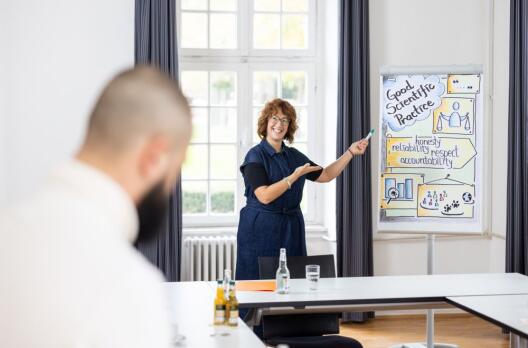





With our focus on good scientific practice, we at CERes aim to:
We understand good scientific practice as the fundamental prerequisite for excellent and credible scientific research, requiring respectful and constructive interactions (see, e.g., DFG 2019: 7, Code of Conduct of the University of Münster). Compliance with good scientific practice enables us to remain true to general human and social values, such as trust in science, prosocial behaviour, integrity, and the respectful and efficient use of public resources.
The values inherent in good scientific practice, such as the acknowledgement of originality and quality, honesty, openness to new findings, responsibility, and independence, are firmly embedded in our scientific ethos. These values ensure that, as scientists, we work lege artis, conducting research according to ethical, legal and discipline-specific obligations and standards. Examples include the meticulous handling and documentation of all data in line with recognised standards and practices within the respective discipline, a rigorous questioning of all findings, and maintaining strict honesty as regards one’s contributions and those of other people (ensuring the protection and recognition of intellectual property).
Not every infringement of good scientific practice should be immediately categorised as scientific misconduct. Scientific misconduct involves intention or gross negligence and encompasses the following categories: 1) making false statements intentionally or due to gross negligence, such as fabricating or falsifying data or sources; 2) interfering with other people’s research activities (e.g., through sabotage or the destruction of documents or chemicals); 3) infringement of intellectual property, such as plagiarism or claiming other people’s authorship without their consent; and 4) bearing co-responsibility (e.g., by knowing about falsification and failing to take action or through a gross neglect of supervisory duties).

All researchers at the University of Münster are responsible for exhibiting the fundamental values of good scientific practice in their conduct, and for advocating for them. In July 2023, the Senate passed the Statute “Securing good scientific practice”, which obliges researchers and academic staff of the University to exercise fairness and honesty in academic work. They are also obliged by the Statute to continuously update their knowledge about the standards of good scientific practice and to engage in dialogue with other scientists. There are numerous events organised by the individual faculties and Münster Centre for Emerging Researchers (CERes) for that purpose. Doctoral supervisors play an especially important role in teaching good scientific practice because, as heads of individual research units, they are responsible for supervising emerging researchers and supporting their careers. In line with the Statute, doctoral researchers and their supervisors can also be obliged to comply with the rules of good scientific practice through doctoral regulations and supervision agreements within the faculties.
The Münster Centre for Emerging Researchers (CERes) encourages researchers to grow their knowledge of standards of good scientific practice, offering events tailored to their needs. We are able to cover different aspects thanks to our internal partners, who contribute their expertise to the design, planning and running of the events (e.g., ULB Central Library and digital publishing). Visit our “Workshops” webpage for information about our current Good Scientific Practice events.
Browse our University's website to find other topically related courses that are offered by your faculty (e. g., Faculty of Medicine), structured doctoral programme (e.g., CiM-IMPRS) or other institutions at our University (e.g., IVV Natural Sciences).
How do I handle a conflict in my supervisory relationship? To whom can I turn for answers about scientific misconduct? We at CERes offer impartial, fair, qualified, and strictly confidential advice. “Further advisory services” on this webpage lists other potential contact persons for researches at the University of Münster.
Would you like to learn what happens in a consultation and how advisory services can support you? Discover the brochure “How can I deal with conflicts and remain true to good scientific practice?”. This brochure, created by seven advisory services at the University of Münster, clearly shows how to find solutions to various problems with their help.